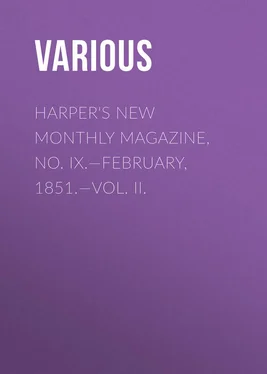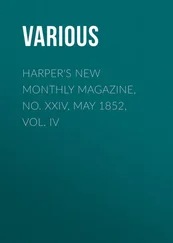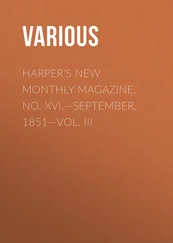Various - Harper's New Monthly Magazine, No. IX.—February, 1851.—Vol. II.
Здесь есть возможность читать онлайн «Various - Harper's New Monthly Magazine, No. IX.—February, 1851.—Vol. II.» — ознакомительный отрывок электронной книги совершенно бесплатно, а после прочтения отрывка купить полную версию. В некоторых случаях можно слушать аудио, скачать через торрент в формате fb2 и присутствует краткое содержание. Издательство: Иностранный паблик, Жанр: periodic, foreign_edu, на английском языке. Описание произведения, (предисловие) а так же отзывы посетителей доступны на портале библиотеки ЛибКат.
- Название:Harper's New Monthly Magazine, No. IX.—February, 1851.—Vol. II.
- Автор:
- Издательство:Иностранный паблик
- Жанр:
- Год:неизвестен
- ISBN:нет данных
- Рейтинг книги:4 / 5. Голосов: 1
-
Избранное:Добавить в избранное
- Отзывы:
-
Ваша оценка:
- 80
- 1
- 2
- 3
- 4
- 5
Harper's New Monthly Magazine, No. IX.—February, 1851.—Vol. II.: краткое содержание, описание и аннотация
Предлагаем к чтению аннотацию, описание, краткое содержание или предисловие (зависит от того, что написал сам автор книги «Harper's New Monthly Magazine, No. IX.—February, 1851.—Vol. II.»). Если вы не нашли необходимую информацию о книге — напишите в комментариях, мы постараемся отыскать её.
Harper's New Monthly Magazine, No. IX.—February, 1851.—Vol. II. — читать онлайн ознакомительный отрывок
Ниже представлен текст книги, разбитый по страницам. Система сохранения места последней прочитанной страницы, позволяет с удобством читать онлайн бесплатно книгу «Harper's New Monthly Magazine, No. IX.—February, 1851.—Vol. II.», без необходимости каждый раз заново искать на чём Вы остановились. Поставьте закладку, и сможете в любой момент перейти на страницу, на которой закончили чтение.
Интервал:
Закладка:
This mournful event took place about eight o'clock on the morning of the 20th of January, 1790 – 1500 miles from his native land, with only strangers round about his bed; strangers, not to his heart, though their acquaintance with his virtues had been brief – but to his race, his language, and his creed. He, however, who was the friend of all – the citizen of the world, in its highest sense – found friends in all. Never perhaps had mortal man such funeral honors. Never before, perhaps, had a human being existed in whose demise so universal an interest could be felt. His death fell on the mind of Europe like an ominous shadow; the melancholy wail of grief which arose on the Dnieper, was echoed from the Thames, and soon re-echoed from the Tagus, and the Neva, and the Dardanelles. Every where Howard had friends – more than could be thought till death cut off restraint, and threw the flood-gates of sympathy wide open. Then the affluent tide rolled in like the dawn of a summer day. Cherson went into deep mourning for the illustrious stranger; and there was hardly a person in the province who was not greatly affected on learning that he had chosen to fix his final resting-place on the Russian soil. In defiance of his own wishes on the subject, the enthusiasm of the people improvised a public funeral. The Prince of Moldavia, Admirals Priestman and Mordvinoff, all the generals and staff officers of the garrison, the whole body of the magistrates and merchants of the province, and a large party of cavalry, accompanied by an immense cavalcade of private persons, formed the funeral procession. Nor was the grief by any means confined to the higher orders. In the wake of the more stately band of mourners, followed on foot a concourse of at least three thousand persons – slaves, prisoners, sailors, soldiers, peasants – men whose best and most devoted friend the hero of these martial honors had ever been; and from this after, humbler train of followers, arose the truest, tenderest expression of respect and sorrow for the dead. When the funeral pomp was over, the remains of their benefactor lowered into the earth, and the proud procession of the great had moved away, then would these simple children of the soil steal noiselessly to the edge of the deep grave, and, with their hearts full of grief, whisper in low voices to each other of all that they had seen and known of the good stranger's acts of charity and kindness. Good indeed he had been to them. Little used to acts or words of love from their own lords, they had felt the power of his mild manner, his tender devotion to them, only the more deeply from its novelty. To them, how irreparable the loss! The higher ranks had lost the grace of a benignant presence in their high circle; but they – the poor, the friendless – had lost in him their friend – almost their father. Nature is ever true; they felt how much that grave had robbed them of. Not a dry eye was seen among them; and looking sadly down into the hole where all that now remained of their physician lay, they marveled much why he, a stranger to them, had left his home, and his friends, and country, to become the unpaid servant of the poor in a land so far away; and not knowing how, in their simple hearts, to account for this, they silently dropped their tears into his grave, and slowly moved away – wondering at all that they had seen and known of him who was now dead, and thinking sadly of the long, long time ere they might find another friend like him.
The hole was then filled up – and what had once been Howard was seen of man no more. A small pyramid was raised above the spot, instead of the sun-dial which he had himself suggested; and the casual traveler in Prussian Tartary is still attracted to the place as to one of the holiest shrines of which this earth can boast.
Words can not depict the profound sensation which the arrival of this mournful news produced in England. The death-shaft cut the withes which had kept his reputation down. All at once the nation awoke to a full consciousness of his colossal fame and his transcendent virtues. Howard was now – history. Envy and jealousy were past: rivalry had ended on the brink of the grave. Death alone sets a man on fair terms with society. The death of a great man is always a calamity; but it is only when a country loses one of its illustrious children in a distant land, and under peculiar circumstances, that the full measure of the national calamity is felt. They who can recollect the wild and deep sensation of pity and regret which the arrival of the news of Byron's death at Missolonghi produced in England, can alone conceive of any thing like the state of the public mind on the first announcement of the close of a career still more useful and more glorious. Every possible mark of honor – public and private – was paid to the memory of Howard. All orders of men vied with each other in heaping honors upon his name. The court, the press, parliament, the bar, the pulpit, and the stage – each in its different fashion – paid the well-earned tribute of respect. The intelligence of his demise was publicly announced in the official Gazette – a distinction never before accorded to a private individual. The muses sang his virtues with innumerable voices; the churches echoed with his praise; the senate and the judgment-seat resounded with the tribute to his merits; and even at the theatres, his character was exhibited in imaginary scenes, and a monody on his death was delivered from the foot lights.
Nor was a more enduring memorial wanting. The long dormant Committee of the Howardian fund was resuscitated, and the sculptor Bacon was employed to make a full length marble statue of the Philanthropist. At that time it was in contemplation to make St. Paul's serve the double purpose of a cathedral and a Walhalla; and this design was inaugurated by placing there, as the first great worthy of England, the statue of John Howard. It stands immediately on the right hand of the choir-screen; it is a handsome figure, tolerably faithful, and is illustrated by emblems of his noble deeds, and by the following inscription: "This extraordinary man had the fortune to be honored, while living, in the manner which his virtues deserved; he received the thanks of both houses of the British and Irish Parliaments, for his eminent services rendered to his country and to mankind. Our national prisons and hospitals, improved upon the suggestion of his wisdom, bear testimony to the solidity of his judgment, and to the estimation in which he was held. In every part of the civilized world, which he traversed to reduce the sum of human misery – from the throne to the dungeon – his name was mentioned with respect, gratitude, and admiration. His modesty alone defeated various efforts that were made during his life to erect this statue, which the public has now consecrated to his memory. He was born at Hackney, in the county of Middlesex, September 2, 1726. The early part of his life he spent in retirement, residing principally upon his paternal estate at Cardington, in Bedfordshire; for which county he served the office of sheriff in the year 1763. He expired at Cherson, in Russian Tartary, on the 20th of January, 1790, a victim to the perilous and benevolent attempt to ascertain the cause of, and find an efficacious remedy for the plague. He trod an open but unfrequented path to immortality in the ardent but unintermitted exercise of Christian charity: may this tribute to his fame excite an emulation of his truly glorious achievements!"
A SKETCH OF MY CHILDHOOD
Once having begun, it followed naturally that the war should deepen in bitterness. Wounds that wrote memorials in the flesh, insults that rankled in the heart – these were not features of the case likely to be forgotten by our enemies, and far less by my fiery brother. I, for my part, entered not into any of the passions that war may be supposed to kindle, except only the chronic passion of anxiety. Fear it was not; for experience had taught me that, under the random firing of our undisciplined enemies, the chances were not many of being wounded; but the uncertainties that beset every conflict, as regarded my power to maintain the requisite connection with my brother, and the absolute darkness that brooded over that last worst contingency – the case of being captured, and carried off to Gath as a trophy won from Israel – these were penalties attached to the war that ran too violently into the current of my constitutional despondency, ever to give way under any casual elation of success. Success we really had at times — often in skirmishes; and once, at least, as the reader will find to his mortification, if he is wicked enough to take the side of the Philistines, a most smashing victory in a pitched battle. But even then, and while the hurrahs were yet ascending from our jubilating lips, the freezing memento came back to my heart of that deadly depression which, duly at the coming round of the morning and evening watches, traveled with me like my shadow on our approach to the memorable bridge. A bridge of sighs 2 2 " Bridge of sighs :" – Two men of memorable genius, Hood last, and Lord Byron by many years previously, have so appropriated this phrase, and re-issued it as English currency, that many readers suppose it to be theirs. But the genealogies of fine expressions should be more carefully preserved. The expression belongs originally to Venice. This jus postliminii becomes of real importance in a case like that of Shakspeare. It is a most remarkable fact that he is made to seem a robber of the lowest order by mere dint of suffering robbery. Purely through their own jewelly splendor, have many hundreds of his phrases forced themselves into usage so general, under the vulgar infirmity of seeking to strengthen weak prose by shreds of poetic quotation, that at length the majority of careless readers came to look upon these phrases as belonging to the language, and traceable to no distinct proprietor any more than proverbs: and thus, on afterward observing them in Shakspeare, they regard him in the light of one accepting alms (like so many meaner persons) from the common treasury of the universal mind, on which treasury he had himself conferred them as original donations of his own. Many expressions in the "Paradise Lost," in "Il Penseroso," and in "L'Allegro," are in the same predicament: from glorifying their author, so long as they were consciously referred to him as their author, they have, at least, ended in tarnishing his glory. As creations, they were marks of power; as tributes levied upon a common stock, they become arguments of weakness.
too surely it was for me; and even for my brother it formed an object of fierce yet anxious jealousy, that he could not always disguise, as we first came in sight of it: for, if it happened to be occupied in strength, there was an end of all hope that we could attempt the passage; and that was a fortunate solution of the affair, as it imposed no evil beyond a circuit; which, at least, enjoyed the blessing of peace, although the sarcastic public might choose to call it inglorious. Even this shade of ignominy, however, my brother contrived to color favorably, by calling us – that is, me and himself – "a corps of observation;" and he condescendingly explained to me, that although making "a lateral movement," he had his eye upon the enemy, and "might yet come round upon his left flank in a way that wouldn't perhaps prove very agreeable." This, from the nature of the ground, never happened. We crossed the river out of sight from the enemy's position; and my brother's vengeance, being reserved until he came round into the rear of Philistia, from which a good retreat was always open to Greenhay; naturally discharged itself in triple deluges of stones. On this line of policy there was, therefore, no cause for anxiety; but the common case was, that the numbers might not be such as to justify this caution, and yet quite enough for mischief. For my brother, however, stung and carried headlong into hostility by the martial instincts of his nature, the uneasiness of doubt or insecurity was swallowed up by his joy in the anticipation of victory, or even of contest; while to myself, whose exultation was purely official and ceremonial, as due by loyalty and legal process from a cadet of the belligerent house, no such compensation existed. The enemy was no enemy in my eyes; his affronts were but retaliations; and his insults were so inapplicable to my unworthy self, being of a calibre exclusively meant for the use of my brother, that from me they recoiled, one and all, as cannon-shot from cotton bags.
Интервал:
Закладка:
Похожие книги на «Harper's New Monthly Magazine, No. IX.—February, 1851.—Vol. II.»
Представляем Вашему вниманию похожие книги на «Harper's New Monthly Magazine, No. IX.—February, 1851.—Vol. II.» списком для выбора. Мы отобрали схожую по названию и смыслу литературу в надежде предоставить читателям больше вариантов отыскать новые, интересные, ещё непрочитанные произведения.
Обсуждение, отзывы о книге «Harper's New Monthly Magazine, No. IX.—February, 1851.—Vol. II.» и просто собственные мнения читателей. Оставьте ваши комментарии, напишите, что Вы думаете о произведении, его смысле или главных героях. Укажите что конкретно понравилось, а что нет, и почему Вы так считаете.












